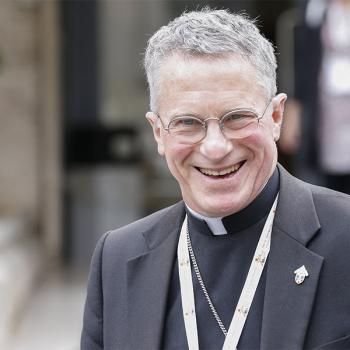Lectionary Reflections
Luke 3:7-18
December 30, 2012
When my "baby" brother Robert was five years old, he had blonde curls and big blue eyes and was just about the most adorable little boy imaginable. (I have his permission to share this personal, but positive, description of him!)
He was assigned a part in the Christmas Eve pageant by its director, Mrs. Betty Hefflebauer. He had his heart set on being a wise man because of the cool costumes. But she did not cast him as a wise man. Nor did she cast him as Joseph, the inn keeper, or a shepherd. To her mind, none of these parts seemed quite right for him.
Instead she gave him what my mother tried to convince him was the most important part of all—the narrator. He only had one line, and it was straight out of Scripture (Luke 2:40). After all the actors in the pageant had processed down the double aisles to the front and had taken their places in the Nativity Scene at the front, little Robert was to come out, walk to the center, pause to heighten the moment, gesture dramatically toward the baby, and say, loudly and clearly, "And the child grew and became strong!" He had the last word of the whole play. That was what my mother kept telling him.
My mother took him to Sears and bought him a Christmas suit: little black pants, a red velvet blazer, a white shirt, and a clip-on bow tie for his acting debut. We all helped him practice around the house, prompting him with the first part of his line, "And the child grew..." to which he would chime in "and became strong!"
Other times, he would start things off by saying, out of the blue, "And the child grew," to which the whole family would respond in chorus, "and became strong!" Add to that the weekly practices during Sunday school and, by the time Christmas Eve arrived, our little thespian was set to do the family proud.
We're still not sure what happened that night. Maybe it was because he had never practiced making his entrance and saying his line in a darkened sanctuary. During Sunday school there was always light streaming through the Garden of Gethsemane window at the back. Maybe it was because he had never practiced making his entrance and saying his line with the place packed with people.
Whatever the reason, when the Holy Family and their entourage were in place and his moment came, Robert walked out, his red velvet jacket glowing in the candlelight, and stood in front of the congregation. He was a baby deer with blonde curls and big blue eyes caught in the headlights.
He opened his mouth, and nothing came out. His eyes began to glimmer, and his little lip trembled. He looked toward the baby and gestured, but couldn't get the words out. Mrs. Hefflebauer, from her position as prompter crouched behind the lectern, whispered to him, "Pssst, Robert...And the child grew and became strong."
Still nothing. Again she whispered, this time a little louder, "And the child grew and became strong."
Suddenly, a look of relief washed over his cherubic countenance. He leaned forward in a conspiratorial manner and whispered to the congregation in an audible and even dramatic stage whisper, "And the child grew and became strong!"
Practicing Our Lines for Epiphany
Epiphany begins next week, January 6. It takes its name from the Greek word epiphaneia, which signifies a "manifestation," "striking appearance," or "theophany." Epiphany, as a Christian feast day, celebrates the revelation of God the Son as a human being in Jesus Christ. Both Western and Eastern Christian traditions celebrate the visit of the Magi and Jesus' baptism by John.
Traditionally, Western Christians have focused on the visitation of the Magi to the baby Jesus, and thus the revelation of Jesus' identity to the Gentile world. Eastern Christians have focused on the baptism of Jesus in the Jordan, seen as his manifestation to the world as the Son of God. Both emphases occur in the texts chosen by the Revised Common Lectionary in the weeks ahead. The season of Epiphany is a four-week journey that takes us to the Transfiguration of our Lord.
In the Church Calendar, this Sunday, December 30, is listed simply as "First Sunday after Christmas Day." That seems like too bland a banner to me. I'd rather call it "Preparation for Epiphany Sunday," because we need some time to learn what our role is supposed to be and to practice our lines.
During Epiphany our role is to celebrate the manifestation of the identity of Jesus as Son of God to the whole world. Our role is to allow the presence of Jesus to have an ever stronger influence on our lives. Our role is to allow Jesus to be who he was sent to be.
That to me is one lesson his parents learn in the vignette recounted in Luke 2:41-52. They find out that the boy Jesus, in growing and becoming strong, is not under their control and will not always be found at their side. When they finally track him down in the Temple, his mother's question is focused on the anxiety and perhaps inconvenience he has caused his family: "Child, why have you treated us like this?" But Epiphany is not about our peace of mind and convenience. It's about assuming our role of allowing Jesus to grow and become strong in our lives and in this world.
My brother's lines were the last words of the Christmas play and the first words of the season of Epiphany: "And the child grew and became strong."
Keep your eye on that child this Epiphany and see how he grows and where he goes. Keep your eye on that child this Epiphany, and see where he takes you and how he shapes you.
12/2/2022 9:10:31 PM





